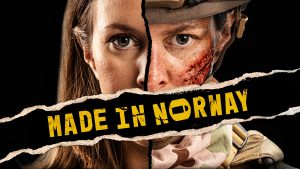(THIS ARTICLE IS MACHINE TRANSLATED by Google from Norwegian)
On Thursday, March 12, NRK Radio Theater will premiere on the thrill series Made in Norway. It is a hearing games for six episodes on Norwegian arms trade.
The drama series starts with Norwegian soldiers in Iraq, under American command, being ordered out on a mission and revealing that rebels have weapons stockpiles with rockets manufactured at Raufoss. This scenario is not unrealistic and it strikes me. I grew up on Raufoss, and I worked in Central America when missiles from my hometown were used by rebels fighting against Norway's political allies. The relationship was denied by the ammunition factory until the facts could not be refuted. The Norwegian authorities were embarrassed.
Ethical issues
Norwegian arms trade to colorful addresses, be it to Jair Bolsonaros Brazil, to the emir of Kuwait or to the dictatorship in Thailand, has been normalized. Such connections were previously considered scandals. Now they are happy things in Teknisk Ukeblad. Therefore, it is refreshing to NRK and screenwriter Vegard Steiro Amundsen highlights ethical issues that have not been discussed in the Norwegian public without the government's refusal to state that Norway's security depends on revenue from the sale of military products to "emerging markets in the Middle East".
The logic behind Norway's security depends on revenues from arms sales, is that weapon technology is costly to develop. Today we are in the elite division. If we tighten export practices, revenues will shrink, and we will no longer be able to finance new technology. We will slow down and our defense will suffer.
This production is cheap, but sold as a justification, if not the only one, for 80-90 per cent of military production in Norway to be sold out of the country. Most of it goes to NATO allies and other natural partners. For example, Oman, which trades for billions in Norway.
We closed the deal when government officials killed and jailed journalist Jamal Khashoggi inside the Saudi Arabian consulate in Istanbul.
Our export regulations specify that we must take into account democratic and human rights issues in the countries we export to – and so do we. In the case of Saudi Arabia, which we have supplemented with military equipment for a number of years, though neither weapons nor ammunition, we closed the deal when representatives of the authorities killed and parted the journalist jamal khashoggi inside the Saudi Arabian Consulate in Istanbul. Then human rights struck for the Norwegian authorities.
No one talks about end stations
Captain Oda Skar is in command of the NRK Radio Theater's military operation in Iraq. She's from Raufoss. The family works at the gun manufacturer Nammo, the backbone of the local community. She meets the family's products in the field, and it results in fatalities for civilian Iraqis and a Norwegian soldier. Thus, the doubt is sown at Oda, who is beginning to take an interest in the principles behind Norwegian arms trade. It is not popular either on Raufoss or in the government.
For me who grew up on Raufoss, this is old news. No one in the industry is raising debates during the lunch break about where the next shipment is going. The trade union movement is perfectly in line with the most ongoing salesmen. We secure jobs and do not want information on end stations. When the oil age is over, we can survive war – if we turn right.
The weapons industry is a burden
Not all the twists in the series are equally realistic. Oda Skar has a childhood friend who works in the regional newspaper Oppland Arbeiderblad. The friend wants to run critical journalism and wants information from Oda. Reality's Oppland Arbeiderblad is rougher against those who question the cornerstone company's practice.
Raufossinger experiences the stress of living in the weapons industry and does not find opportunities to raise the topic. It's taboo.
About two years ago I wrote the book Peace is not the best, which deals with arms trafficking and the psychology of a war-torn society. I expected reactions, but did not expect the editor in the regional newspaper to let one of his trusted journalists slaughter it and cast doubt on my accountability. The publication was seen as a betrayal of the Raufoss community, and the newspaper reacted immediately, before others were able to comment.
After that, one email after another ticked in with me, gripping stories from rough-casts who are experiencing the stress of living in the weapons industry and who cannot find the opportunity to lift the theme. It's taboo.
Shameful political theater
The ammunition industry is a generous sponsor of skiers and skiers. While Raufoss Football climbed the divisions, with good results at the Nammo Stadium, the UD approved ammunition exports to the United Arab Emirates.
Norway should not sell military equipment to countries that are at war, civil war or where war threatens, therefore we do not export to government in Yemen. The Foreign Ministry, however, did not find it reasonable that the Emirates, waging a deputy war in Yemen, be affected by our strict regulations. Civil war with mutilated children and feud between clans, it was worth trying.
Only after two and a half years of war and protests from humanitarian organizations was the export license for ammunition withdrawn.

The Norwegian authorities have entangled us in a situation where we increasingly make the industry dependent on income from Sheikh empire and war zones, contrary to the intentions of the export regulations. India is now a focus area. Who's going to get us out of this hammock?
In a scene in Made in Norway states the foreign minister: "Norwegian soldiers with their presence create stability in the Middle East." Here the screenwriter takes the reality of the grain. We witness a shameful political theater, and the arms trade is part of the play. It does not serve Norwegian interests.
Read excerpts from Hoel's book Peace is not the best.
(Illustrative photo: Pixabay)






